De Nederlandse schrijver Godfried Bomans werd geboren in Den Haag op 2 maart 1913. Zie ook alle tags voor Godfried Bomans op dit blog.
Uit: Pieter Bas
“Zij trok langs ons huis dwars over het Muntplein; ik stond ademloos met mijn neus tegen het vensterglas, en was in het bijzonder verbaasd dat er zoveel rijtuigen nodig waren om één dode man te vervoeren.
Ik herinner mij ook de merkwaardige voorstelling, die ik mij hierover vormde, als zou in elk rijtuig een stukje van zijn lichaam gelegd zijn.
Soldaatje spelen was reeds vroeg mijn lust en mijn leven. Wij bezaten, ik weet het nog goed, zestig loden soldaatjes, waarvan er één geen hoofd had zodat wij hem generaal maakten. De overige stelden wij op in een indrukwekkende slagorde, waaraan wij minstens een uur besteedden, en dan – dan was het uit. Want het lodensoldatenspel bezit deze eigenaardigheid dat het afgelopen is op het ogenblik, dat het eigenlijk beginnen moet. Als het excerceren, het opstellen en het paraderen voorbij is en het gevecht een aanvang behoort te nemen, is de aardigheid eraf. Ik heb later opgemerkt dat dit ook bij andere soldaten het geval is.
’s Avonds zaten wij allen, vader, moeder, vier jongens en twee meisjes, onder het lamplicht bijeen aan een grote tafel. Als ik aan die tijd terugdenk zie ik mij altijd op één bepaalde avond, die mij in het bijzonder goed in het geheugen is gebleven, toen de wind om het oude huis woei en vader met halfluide stem een artikel uit De Dordtsche Bazuin voorlas, waarvan wij allen niets begrepen, doch dat ons een bijzonder gevoel van veiligheid en rust gaf. Later, als gevolmachtigde te Genève, heb ik dikwijls langs de vergadertafel gekeken en gewenst dat mijn vader met De Dordtsche Bazuin daar zat, en mijn moeder, mijn drie broers en mijn twee zusters; en soms – men vergeve het mij – heb ik gemeend dat het een weldaad voor de wereld zou geweest zijn
De eerste mannelijke wezens die ik op mijn levenspad ontmoette, waren mijn drie broeders, Vincent, Prick en Jozef. Zij sliepen gedrieën in één groot bed, en toen ik oud genoeg was, werd er een stukje aangebouwd en kwam ik erbij. Dit was een uitvinding van mijn vader; hij vond het zo overzichtelijk.
Dit enorme bed was een bron van onenigheid. Want Vincent, die de oudste en sterkste was, placht zich een onrechtvaardig groot deel van de dekens toe te eigenen: hij stopte zich goed van alle kanten in en viel genoeglijk knorrend in slaap.”
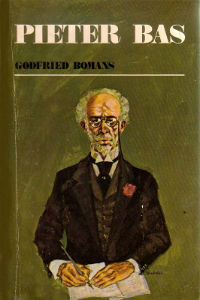
Godfried Bomans (2 maart 1913 – 22 december 1971)
Cover
De Nederlandse schrijver Multatuli (pseudoniem van Eduard Douwes Dekker) werd geboren in Amsterdam op 2 maart 1820. Zie ook alle tags voor Multatuli op dit blog.
Uit: Max Havelaar
“En dan die beloonde deugd! O, o, o! Ik ben sedert zeventien jaren makelaar in koffie — Lauriergracht No 37 — en heb dus al zoiets bijgewoond, maar het stuit mij altijd vreselijk, als ik de goede lieve waarheid zo zie verdraaien. Beloonde deugd? Is ’t niet om van de deugd een handelsartikel te maken? Het is zo niet in de wereld, en ’t is goed dat het zo niet is. Want waar bleef de verdienste, als de deugd beloond werd? Waartoe dus die infame leugens altijd voorgewend?
Daar is bijvoorbeeld Lukas, onze pakhuisknecht, die reeds bij de vader van Last & Co. heeft gewerkt — de firma was toen Last & Meyer, maar de Meyers zijn er lang uit — dàt was dan toch wel een deugdzaam man. Geen boon kwam er ooit tekort, hij ging stipt naar de kerk, en drinken deed hij niet. Als mijn schoonvader te Driebergen was, bewaarde hij het huis, en de kas, en alles. Eens heeft hij aan de bank zeventien gulden teveel ontvangen, en, hij bracht ze terug. Hij is nu oud en jichtig, en kan niet meer dienen. Nu heeft hij niets, want er gaat veel bij ons om, en we hebben jong volk nodig. Welnu, ik houd die Lukas voor zeer deugdzaam, maar wordt hij nu beloond? Komt er een prins die hem diamanten geeft, of een fee die hem boterhammen smeert? Waarachtig niet! Hij is arm, en blijft arm, en dit moet ook zo wezen. Ik kan hem niet helpen — want we hebben jong volk nodig, omdat er zoveel bij ons omgaat — maar al kon ik, waar bleef zijn verdienste, als hij nu op zijn oude dag een gemakkelijk leven leiden kon? Dan zouden alle pakhuisknechts wel deugdzaam worden, en iedereen, hetgeen Gods bedoeling niet wezen kan, omdat er dan geen bijzondere beloning voor de braven overbleef hiernamaals. Maar op een toneel verdraaien ze dat … alles leugens!”
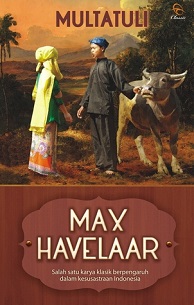
Multatuli (2 maart 1820 – 19 februari 1887)
Cover
De Vlaamse schrijver Frank Albers werd geboren op 2 maart 1960 in Schoten. Zie ook alle tags voor Frank Albers op dit blog.
Uit: Caravantis
“Dit is een onmogelijk land in november, de dagen raken niet meer uit het grijs, de nachten zijn koud en niemand weet wanneer de boten weer zullen varen.
‘U bent vrij,’ zegt de bewaarder, die hem na al die jaren voor het eerst in de ogen kijkt terwijl hij de buitendeur van de gevangenis ontgrendelt en hem een witte plastic zak overhandigt, ‘het ga u goed.’
Op de pier zitten vissers gebogen onder hun zwarte kappen zwijgend voor zich uit te staren, miezel valt geruisloos op het water als een onleesbaar schrift en in de verlaten jachthaven rusten afgetuigde zeilboten met namen als Liberty, Nelly en Zwart geld.
In vrachtwagens geparkeerd aan de rand van de stad ontwaken mannen met vreemde paspoorten uit onverstaanbare dromen, een zeemeeuw rukt uit een metalen vuilnismand wat meeuwen eetbaar vinden, een rolluik ratelt, een postbode verspreidt wensen en door de ramen van lege winkels kijken besuikerde rendieren verschrikt naar lampions en plastic engelen die wiegen aan draden boven de glinsterende straten.
‘Kom,’ zegt een vrouw tegen het kind dat geen kind meer is maar dat toch nog in haar armen slaapt, ‘het is tijd.’ In kamer 201 van Hotel Poseidon kijkt een Amerikaanse journalist naar beelden van de ravage die een aardbeving in Australië heeft aangericht terwijl in een keurig huis in een keurige buitenwijk een man zonder dromen naar het plafond ligt te staren. Het kind hoort de douche en denkt aan zijn moeder die nu naakt is.
De flats onbewoond, de bussen op stal, fietsen en go-carts aan haken, in het gras op de camping geen rosse plekken meer, alle vlaggen gestreken. Op het puin van de afgebrande schouwburg snuffelen natte, dampende honden die elkaar soms bespringen, zachtjes jankend of grommend, en dan weer verder snuffelen, rusteloos en vergeetachtig zoals alleen de lust kan zijn.
‘Tot straks,’ zegt de vrouw van de oud-rechter tegen haar man die aan de tafel in de tuinkamer over de krant gebogen zit. ‘Tot straks,’ zegt hij zonder op te kijken van het paginagrote kruiswoordraadsel.”
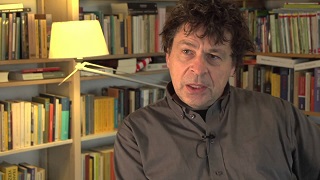
Frank Albers (Schoten, 2 maart 1960)
De Amerikaanse schrijver John Irving werd geboren op 2 maart 1942 in Exeter, New Hampshire. Zie ook alle tags voor John Irving op dit blog.
Uit: Avenue of Mysteries
“It was a Monday – January 3, 2011 – and the young woman seated next to Juan Diego was worried about him. Philippine Airlines 174, from Tagbilaran City to Manila, was quite a rowdy flight for a 7:30 a.m. departure; yet the woman beside Juan Diego told the flight attendant that the gentleman had instantly fallen asleep, despite the clamor of their yammering fellow travelers.
“He totally conked out,” the woman said to the stewardess. But soon after falling asleep, Juan Diego began to speak. “At first, I thought he was speaking to me,” the woman told the flight attendant.
Juan Diego didn’t sound as if he were talking in his sleep – his speech wasn’t slurred, his thinking was incisive (albeit professorial).
“In the sixteenth century, when the Jesuits were founded, not many people could read – let alone learn the Latin necessary to preside at Mass,” Juan Diego began.
“What?” the young woman said.
“But there were a few exceptionally devoted souls – people who thought only of doing good – and they yearned to be part of a religious order,” Juan Diego went on.
“Why?” the woman asked him, before she realized his eyes were closed. Juan Diego had been a university professor; to the woman, it must have seemed like he’d been lecturing to her in his sleep.
“These dutiful men were called lay brothers, meaning they were not ordained,” Juan Diego lectured on. “Today, they typically work as cashiers or cooks – even as writers,” he said, laughing to himself. Then, still sleeping soundly, Juan Diego started to cry. “But Brother Pepe was dedicated to children – he was a teacher,” Juan Diego said, his voice breaking. He opened his eyes – he stared, unseeing, at the young woman beside him; she knew he was still conked out, as she would have put it. “Pepe just didn’t feel called to the priesthood, though he’d taken the same vows as a priest – thus he couldn’t marry,” Juan Diego explained; his eyes were closing as the tears ran down his cheeks.”
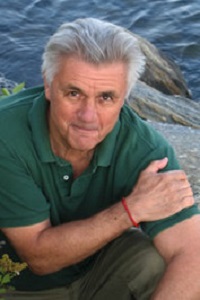
John Irving (Exeter, 2 maart 1942)
De Amerikaanse schrijver en journalist Tom Wolfe werd geboren op 2 maart 1930 in Richmond, Virginia. Zie ook alle tags voor Thomas Wolfe op dit blog.
Uit: I Am Charlotte Simmons
“Dear Momma and Daddy,
I’ll admit my eyes blurred with mist when I saw you drive off in the old pickup.
The old pickup? . . . my eyes blurred with mist? . . . She sighed, she groaned, deflated. What on earth did she think she was writing? She lifted her ballpoint from the top sheet of a pad of lined schoolroom paper and slumped back, or as far back as you could slump in an exhausted wooden chair with no arms. She looked out the window at the library tower. It was lit up ever so majestically in the dark. She saw it, and she didn’t see it. Beverly’s cast-off clothes mashed on the floor, Beverly’s web of extension cords plugged into knuckle sockets in midair, her rat’s nest of a percale-sloshed unmade bed, her littered CD cases, uncapped skin-care tubes, and spilled contact lenses, her techie alphabet toys, the PC, the TV, the CD, DVD, DSL, VCR, IM, MP-4, all of them currently dormant in the absence of their owner, each asleep rattlesnake-like with a single tiny diode-green eye open — her roommate’s slothful and indulgent habits were all over the place . . . Charlotte was sort of aware of it and sort of wasn’t really.
She rocked forward with another trill of low-grade guilt to confront her manuscript . . . the old pickup. Daddy is totally dependent on that poor, miserable old truck, and I’m treating it like it’s something quaint. Eyes blurred with mist . . . Yuk! She could just imagine Momma and Daddy reading that. The ”pretty writing”. . .
She riiiiiiippped the sheet off the pad — then saved it. She could use it for scratch paper. She hunched over the desk and started again:
”Dear Momma and Daddy,
”I hope I didn’t seem too sad when you left that day. Watching you all drive off made me realize” — she starts to write, what a long journey I have set out upon, but the pretty-writing alarm sounds again, and she damps it down to ”how much I was going to miss you. But since then I have been so busy studying, meeting new people, and” — she grandly thinks of figuring out Dupont’s tribal idiosyncrasies, already knowing she’s going to settle for ”getting used to new ways of doing things, I haven’t had time to be homesick, although I guess I am.”

Tom Wolfe (Richmond, 2 maart 1930)
Cover
De Amerikaanse dichter en performer Michael Salinger werd geboren op 2 maart 1962 in Cleveland, Ohio. Zie ook alle tags voor Michael Salinger op dit blog.
Stingray (Fragment)
a giant three pronged gaffing hook
attached to tire swing thick rope
pulls the fish up
dripping
like a Volkswagen being lifted
from a farm pond by crane
three men haul it over the railing
drop it on the deck
slick
white belly up
blood spatter illuminated by mercury vapor
softball size mouth full of pointed teeth
gasping in the terrible air
and
the first baby was a surprise
like a black dinner plate
gliding out from under a rug
but four more followed
each
mindful
of the stinger
gingerly
tossed back into the sea
by astonished fishermen
then the mother is heaved over
smacking the water spread eagle flat
with the sound of
tree split by lightening cracking
predator attracting blood
billowing wake trailing her escape
her offspring
fish born out of water
fly in formation
oblivious to the sacrifice.
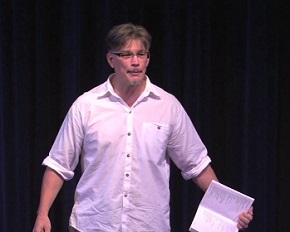
Michael Salinger (Cleveland, 2 maart 1962)
De Hongaarse dichter János Arany werd geboren op 2 maart 1817 in Nagyszalonta. Zie ook alle tags voor János Arany op dit blog.
The Bard Of Wales (Fragment)
“A thousand lie beneath the sky,
They rot beneath the sun,
And we who live shall not forgive
This deed your hand hath done!”
“Now let him perish! I must have”
(The monarch’s voice is hard)
“Your softest songs, and not your wrongs!”
In steps a boyish bard:
“The breeze is soft at eve, that oft
From Milford Havens moans;
It whispers maidens’ stifled cries,
It breathes of widows’ groans.
“You maidens, bear no captive babes!
You mothers, rear them not!”
The fierce king nods. The lad is seiz’d
And hurried from the spot.
Unbidden then, among the men,
There comes a dauntless third
With speech of fire he tunes his lyre,
And bitter is his word:
“Our bravest died to slake your pride –
Proud Edward, hear my lays!
No Welsh bards live who e’er will give
Your name a song a praise.
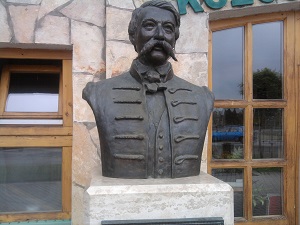
János Arany (2 maart 1817 – 22 oktober 1882)
Borstbeeld in Gyál
De Britse schrijfster Olivia Manning werd geboren op 2 maart 1908 in Portsmouth. Zie ook alle tags voor Olivia Manning op dit blog.
Uit: The Balkan Trilogy (The spoilt city)
“In reaction from a sense of reprimand that touched on their youth, the three, on their way back to the town, laughed uproariously together while the wind blew coldly at them across the dark deserted gradinas. They were glad to reach the lighted streets. As they turned into the square, Harriet looked across at the large, brilliant window on the corner of the Boulevard Breteanu and saw that it was empty. The Hispano, that for two months had stood there like a monument, stood there no longer. Guy ordered the trasurO to stop outside the show-room and went in to inquire. He learnt that the car had been bought by a German officer who had paid the full sixty thousand lei without question, the rate of the Reichsmark being such that the cost of the Hispano was less than the cost in Germany of a toy. The money was being sent to Mr. Dobson at the British Legation. Where were they going to eat? David asked. Harriet wanted to take her farewell dinner at Cina’s or Capsa’s. They decided to drive to Capsa’s. The main restaurants were always refurbished when they returned indoors for the winter months. There was about them all a sense of a new season that held its own excitements. After the vacancy of the streets, Capsa’s interior, with its red plush and gilt and vast crystal chandeliers, seemed dazzling to the three entering, chilly, from the open triisura. Food now was not only meagre, it was often bad, as though shortage had led to hoarding and hoarding to decay. But Capsa’s, much patronised by the German community, had kept a certain standard. The better cuts of meat were, of course, put aside for high-ranking Germans and their guests, but the open menu usually offered chicken or rabbit, hare in season, and even caviare of a sort. Later in the evening the place would be crowded, but now there were a good many vacant tables. “

Olivia Manning (2 maart 1908 – 23 juli 1980)
Cove
Onafhankelijk van geboortedata
De Nederlandse dichteres, schrijfster en illustratrice Rinske Kegel werd geboren in Haren in 1973. Zie ook alle tags voor Rinske Kegel op dit blog.
Geruststelling
Er is een hypochonder waar ik van hou.
Hij had laatst kanker en een maand
terug een blindedarmontsteking.
Dat is niet waarom ik van hem hou.
Het is geruststellend dat hij nog leeft
en mij belt als ik het moeilijk heb.
AIs ik denk dat niemand om mij geeft
belt de hypochonder mij op en zegt
dat hij nog maar kort te leven heeft.
Hij vraagt hoe het met mij gaat.
Het gaat, zeg ik. Het gaat beter
nu je belt. Ben je nu gerustgesteld?
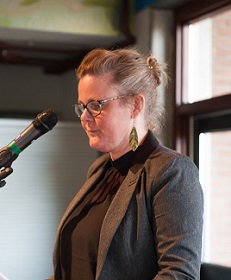
Rinske Kegel (Haren, 1973)
Zie voor nog meer schrijvers van de 2e maart ook mijn blog van 2 maart 2014 deel 2.
Zie voor bovenstaande schrijvers ook mijn blog van 2 maart 2007 en ook mijn blog van 2 maart 2008 en eveneensmijn blog van 2 maart 2009
